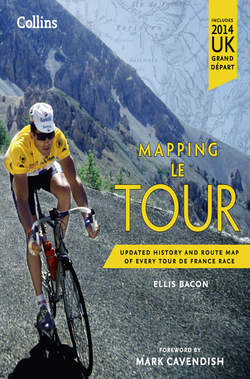Читать книгу Mapping Le Tour: The unofficial history of all 100 Tour de France races - Ellis Bacon - Страница 33
Оглавление1929
23rd Edition
“My race has been won by a corpse.”
Organiser Henri Desgrange bemoans the ailing Belgian Maurice De Waele having won the Tour after being helped by his team-mates
| Start: Paris, France, on 30 JuneFinish: Paris, France, on 28 July | |
| Total distance: 5256 km (3266 miles)Longest stage: 366 km (228 miles) | |
| Highest point:Col du Galibier: 2556 m (8386 ft)Mountain stages: 6 | |
| Starters: 155Finishers: 60 | |
| Winning time: 186 h 39’ 15”Average speed: 28.319 kph (17.596 mph) | |
| 1. Maurice De Waele (Bel)2. Giuseppe Pancera (Ita) at 44’ 23”3. Jef Demuysere (Bel) at 57’ 10” |
Nicolas Frantz and André Leducq had dominated the 1928 Tour as Alcyon team-mates, and that looked set to continue in 1929 when Leducq won the second stage between Caen and Cherbourg, with Frantz following up with victory in Bordeaux on stage 7.
Frantz, Leducq and Elvish-Wolber’s Victor Fontan finished that seventh stage sharing the same overall accumulated time, and in first place at that, which, after 1448 km (900 miles) by that point, was more than a little extraordinary. Unable to separate them, all three were awarded a yellow jersey to wear on the next day’s stage.
While Belgian rider Gaston Rebry took over the yellow jersey from the trio on the next stage, Fontan again took sole control of the race on stage 9. On stage 10, however, Fontan’s forks broke and – after losing too much time – he broke down upon the realisation that his race was over. The Frenchman became the second rider in three years to quit the race while wearing the yellow jersey, after Francis Pélissier in 1927.
Leducq – despite five stage wins in total – and Frantz had fallen out of contention as the race progressed, but their Alcyon team-mate, Maurice De Waele, found himself in a good position to win the race, in second place behind Fontan prior to stage 10. However, De Waele fell ill on that stage and Alcyon’s new plan looked set to derail. De Waele struggled through, though, to take the yellow jersey by default, and from that point on, De Waele’s Alcyon team-mates somehow managed to shepherd him through the rest of the race to Paris and overall victory.
Henri Desgrange was not happy with what in his eyes was an unworthy winner. The power that he felt the bike-manufacturer-sponsored teams held over his race enraged him. It was soon fixed: the next edition, in 1930, would have the riders competing for national, rather than sponsored, teams.
Feverish spectators cheer on the peloton between Belfort and Strasbourg
